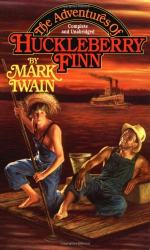|
This section contains 7,837 words (approx. 27 pages at 300 words per page) |

|
SOURCE: Folks, Jeffrey J. “Twain and the Garden of the World: Cultural Consolidation on the American Frontier.” Southern Quarterly 39, no. 3 (spring 2001): 82-95.
In the following essay, Folks outlines Twain's use of certain cultural mythologies in Huckleberry Finn and A Connecticut Yankee in King Arthur's Court, concluding that Twain both accepts and resists the ideas of cultural unity and assimilation.
In Adventures of Huckleberry Finn and A Connecticut Yankee in King Arthur's Court, Mark Twain positions culturally dominant values of commercialism, educational training, and other forms of cultural discipline in opposition to the frontier or to the distant past of Arthurian England (identified in many respects with the recent past of the western and somewhat earlier southern frontier, but also, quite explicitly, drawn from Twain's reading of Charles Ball's history of southern slavery and his family knowledge of the South as frontier). In both texts, the attendant cultural mythologies...
|
This section contains 7,837 words (approx. 27 pages at 300 words per page) |

|


